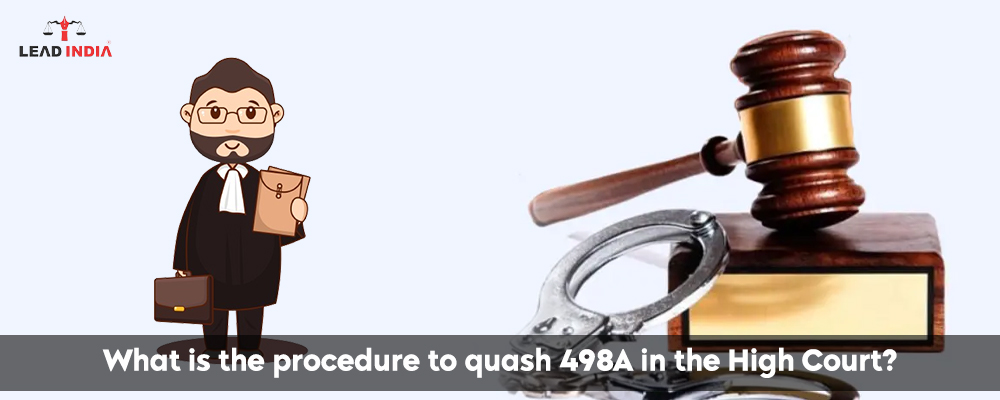After registering an FIR based on the information provided by the person, the police have the authority to arrest the accused and investigate the offense. This legal procedure will be unreasonable, oppressive, or unduly burdensome for the accused person. In that case, the accused person has a remedy: the quashing of FIR. An FIR can be quashed by invoking section 482 of the Criminal Procedure Code, 1973. But in recent judment of 2023 firstly the invesitgaion wil be done and if evidence satisfy the allegtion then the accused may be arrested.
Need A Legal Advice
The internet is not a lawyer and neither are you. Talk to a real lawyer about your legal issue

Legal provisions to quash 498a in high court
- Section 482 of the Criminal Procedure Code, 1973: Saving of inherent power of High Court – Nothing in this code shall be construed to limit or affect the High Court’s inherent powers to make such orders as may be required to carry out any order under this code, to prevent abuse of any court’s process, or to secure the ends of justice. When exercising jurisdiction under section 482 of the code, the High Court would not normally assess whether the evidence in question is credible or if the accusation would not be supported based on a reasonable belief in its trustworthiness. That is the function of the trial judge or court. State of Andhra Pradesh vs. Gourishetty Mahesh, 2010.
- According to Section 498-A of the Indian Penal Code, if a husband or any relative of the husband commits any act of cruelty against a woman who happens to be his wife, he is likely to be imprisoned for a term which may extend to three years. as well as a fine as directed by the Hon’ble Court and as specified in the provisions of Section 498-A. Simply put, cruelty is the infliction of suffering on another person or the failure to act. However, in terms of criminal law, section 13(1) of hindu marriage act and Section 498-A, cruelty refers to a variety of things. Section 498-A broadens the definition of ‘cruelty’ by encompassing a wide range of activities. Cruelty may include punishment, torture, suffering, ignorance, abandonment, mental trauma, physical abuse, mental abuse, emotional abuse, psychological abuse, financial harassment, and so on.
Procedure to quash 498a in High Court
There are two circumstances when a person can approach High under section 482 of CRP.C.:
- When the couple enters into a compromise.
- When it is believed that a false FIR has been filed.
In the first condition, the party will file a joint petition under section 482 along with a consent affidavit the settlement arrived during the divorce gets filed and the FIR is quashed.
In the second condition, the lawyer of the aggrieved party will:
- Filed a petition in the High Court under section 482 of CrPC.
- Serves the copy filed to the opposite party.
- The opposite party may or may not file objections.
- The arguments will be presented by the lawyer
- The Court if satisfied quash the FIR in the exercise of its inherent power.
Period of Limitation
An application to quash and set aside FIR can be filed under Section 482 of the CrPC at any time after an F.I.R. has been filed but before the charge sheet filing stage. However, if circumstances require it even after the charge sheet is filed, the court can exercise its discretionary power under Section 482 CrPC. Once a quash petition is filed, the police submit a report to the court. The quashing of an FIR requires between two and five hearings, which can take anywhere from ten days to three months.
The law is supreme. It gives equal rights to all people. The quashing of fir is also a right, but it is not a mandatory or legally binding process, like the petitioner’s appeal or revision. It is simply a matter of choice among the accused.
The high court dismisses the initial and subsequent proceedings. The accused person will be exempt from the rigorous procedure. If the accused person does not succeed in the quashing petition, the accused person must then appear in the trial court and follow the procedures. Rejection of a quash petition has no negative impact on the case in the trial court. Accused individuals will have the full opportunity to prove their innocence in the trial court.
It is advisable to consult an attorney for filing a petition of quashing. Lead India offers various legal services, including free legal advice and online information. You can talk to a lawyer and ask a legal question on various matters through our platform.




 Talk to a Lawyer
Talk to a Lawyer